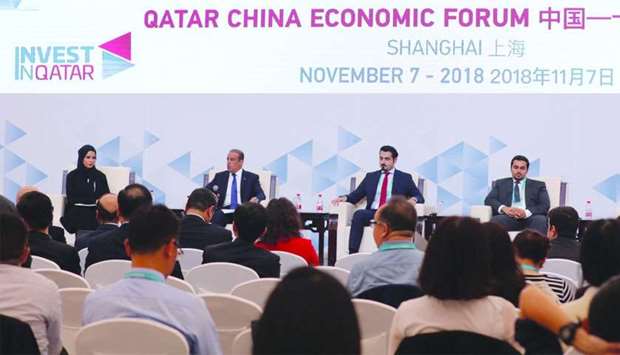HE the Undersecretary at the Ministry of Commerce and Industry, Sultan bin Rashid al-Khater chaired the Qatar-China Economic Forum in Shanghai on Wednesday.
China ranks as Qatar’s third-largest trading partner, with $10.6bn worth of traded goods in 2017, accounting for 10.92% of the country’s total trade volume, said HE the Undersecretary at the Ministry of Commerce and Industry, Sultan bin Rashid al-Khater.
He was chairing the Qatar-China Economic Forum, which took place on the sidelines of the First China International Import Expo in Shanghai on Wednesday.
The event was also attended by Xu Lumi, deputy director general of the Department of West Asian and African Affairs at China’s Ministry of Commerce.
Since the 1980s, Qatar and China have enjoyed friendly relations, marked by the opening of embassies, the exchange of high-ranking official visits and the signing of several co-operation agreements aimed at strengthening economic and trade relations, al-Khater said in his opening speech.
These are mainly related to the promotion and protection of mutual investments, the development of joint investments, and several other memoranda of understanding in the areas of research, health, cultural and education fields, as well as maritime, air and land shipping.
He said these agreements reflect both the countries’ keenness on strengthening co-operation across numerous fields, especially on the economic, trade and investment levels.
Touching on Chinese investments in Qatar, al-Khater said at least 14 fully owned Chinese companies and some 181 joint Qatari-Chinese firms are currently operating in the Qatari market covering areas such as engineering, consulting, contracting, IT, commerce and services sectors.
“Today's conference marks another milestone in the successful journey of Qatari-Chinese partnerships, adding that Qatar looks forward to building on bilateral ties and strengthening co-operation between the Qatari and Chinese private and public sectors to bolster trade and stimulate growth,” al-Khater noted.
Elaborating on the resilience of Qatar’s economy, he said “The wise economic policies that the country’s leadership has pursued to achieve the Qatar National Vision 2030, and build a diversified and competitive knowledge-based economy, have positioned Qatar as one of the most dynamic, stable and diversified investment destinations in the region.”
International agencies have commended Qatar’s wise economic policies and the country’s success in weathering the regional crisis, he said. Fitch Ratings has revised Qatar's outlook as stable, assigning the country '-AA' credit rating, one of the highest worldwide.
Qatar has begun fast-tracking the implementation of “progressive economic policies” and has introduced key amendments to a number of existing business legislations to attract and encourage domestic and foreign investments.
They include the Investment Free Zones Law and the investment of non-Qatari capital in economic activity, which allows up to 100% foreign investment in all economic and trade activities.
Qatar is also in the process of introducing a public and private sectors partnership law to pave the way for the launch of several investment projects, he noted.
Al-Khater reiterated that Qatar welcomes Chinese investors who are looking to tap the promising investment opportunities that the country’s economy offers while working alongside Qatar to achieve shared economic goals.
The forum was aimed at enhancing economic, trade and investment co-operation between Qatar and China and building communication channels between the Qatari and Chinese private sectors to establish joint investment projects that serve the interests of both countries.
The Qatar-China Economic Forum also featured two working sessions.
The first session focused on the opportunities for joint projects, investments and efforts to address challenges, while the second session touched on the 2022 FIFA World Cup, the challenges and opportunities of Qatari-Chinese cooperation as well as the challenges facing Qatar in the energy sector.

